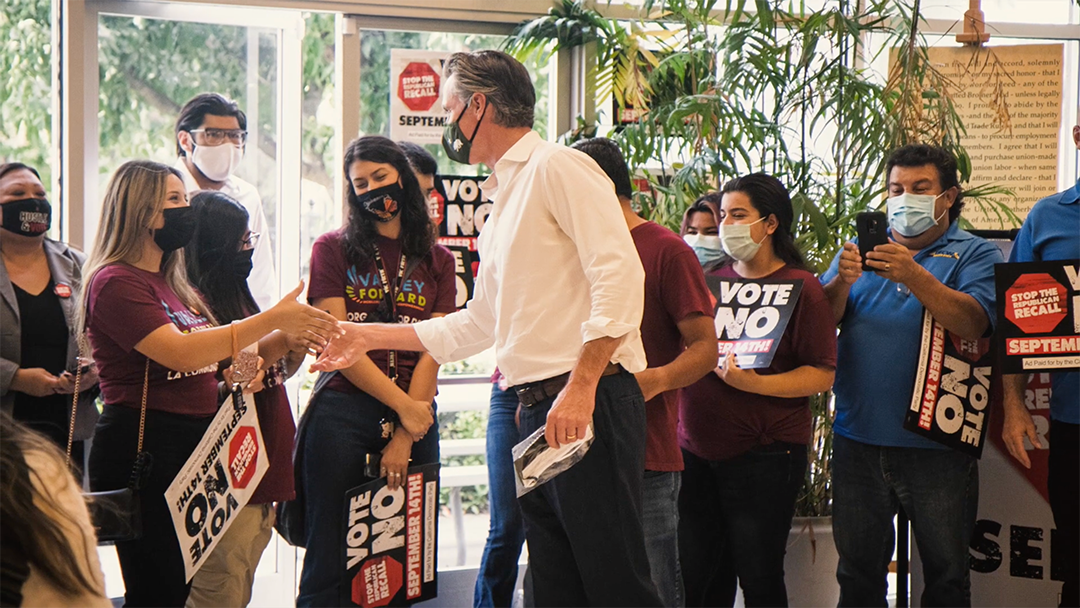As Recall Vote Looms, Valley Forward Will Knock on Doors
Valley Forward is kicking into gear fast now that the election to recall Gov. Gavin Newsom has been moved up to Sept. 14. The organization, which is focusing on the rural Fresno communities where Rep. Valadao outperformed TJ Cox in 2020, planned to have 15 bilingual canvassers in place early this month to increase awareness of the recall election and let residents know why their vote matters.
Dillon Savory, president of Valley Forward, said that many residents in these small communities haven’t even heard about the recall election. And a lot of the working families in the Valley are more worried about putting food on the table and paying the rent than voting in an election.
According to Savory, many households are multigenerational families. And, while most households are mixed status, some families have lived in California for a long time and some include “grandparents that are probably legally here, green card holders.” Most residents work in low paying agricultural, transportation, or manufacturing jobs. Even skilled field supervisors in agriculture may earn at most $12 an hour. Others make less. “It’s not enough,“ Savory said.
“We like to target Spanish-speaking voters because they get the least amount of contact,” said Savory, who has roots in the Valley and is also a labor organizer.
“They get overlooked during the census, they get overlooked in pretty much all regards,” he said. “Those are the folks we want to reach the most.”
They don’t always fit mainstream media portrayals of “typical” Latinos, who are assumed to vote Democratic. Some are inconsistent voters, and others don’t always vote for Democrats. Some are registered Republican, often without knowing that they are. Many never vote—or vote only occasionally—leading to CD21 having the lowest percentage of voting by eligible voters in all of California in the 2020 election.
But Savory thinks that that situation is ripe for change. And Valley Forward’s canvassing and outreach efforts are part of that change.
Valley Forward’s bilingual canvassers have an advantage when it comes to getting people to open their doors to talk. “We do train our canvassers aggressively on the messaging,” Savory said. “But they, through their culture, already have an understanding of what they’re going into.” Most of them have lived in the communities, or similar ones, where they are deployed.
He added, “They’re empathetic, they’re understanding of what their family’s been through. Every grandpa, grandma, mom, dad at the door that we’re trying to target is going to open the door for them.”
Each new canvasser gets solid training for a week, and makes a commitment. They work to knock on at least 80 to 100 doors per day, hoping to get up to 25 doors open and starting conversations with 20. The recall will be a major topic.
“We will build a case for these voters to understand what’s on the ballot,” Savory said. Many don’t know that the current state leadership has done a lot for working families and that the Governor has signed into law the expansion of Medi-Cal to undocumented Californians age 50 and over. “It’s about inspiring them. They’re going to get a ballot.”
Even with a shortened schedule for the recall election, canvassers will make three in-person contact attempts for every door they knock. The first is a neighborhood assessment, where canvassers learn about community needs. The second is an election awareness update. The final contact will provide information about Governor Newsom. Canvassers pair these contacts with phone and email collection to continue a digital connection with every voter through Election Day and into 2022.
The value of this effort goes beyond the recall election to elections next year and beyond, Savory said.
“When you get voters to vote once, that’s ok. But if you get them to do it two or three times in a row, it forms a habit that they and their family will generally continue.”
Building that civic engagement is an important part of CVM’s goal. Valley Forward’s skill and success in fostering civic engagement though relational organizing is a big reason why CVM selected the organization for funding.

